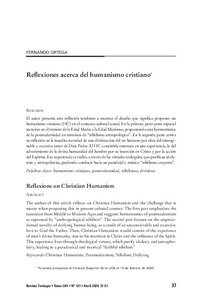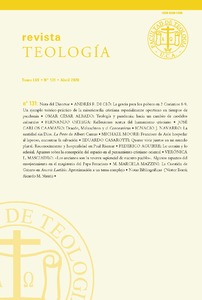Por favor, use este identificador para citar o enlazar este ítem:
https://repositorio.uca.edu.ar/handle/123456789/10019| Campo DC | Valor | Lengua/Idioma |
|---|---|---|
| dc.contributor.author | Ortega, Fernando José | es |
| dc.date.accessioned | 2020-05-19T13:18:12Z | - |
| dc.date.available | 2020-05-19T13:18:12Z | - |
| dc.date.issued | 2020 | - |
| dc.identifier.citation | Ortega, F. Reflexiones acerca del humanismo cristiano. [en línea]. Teología. 2020, 57 (131) Disponible en: https://repositorio.uca.edu.ar/handle/123456789/10019 | es |
| dc.identifier.issn | 0328-1396 (impreso) | - |
| dc.identifier.issn | 2683-7307 (on line) | - |
| dc.identifier.uri | https://repositorio.uca.edu.ar/handle/123456789/10019 | - |
| dc.description.abstract | Resumen: El autor presenta una reflexión tendiente a mostrar el desafío que significa proponer un humanismo cristiano (HC) en el contexto cultural actual. En la primera parte pone especial atención en el tránsito de la Edad Media a la Edad Moderna, proponiendo una hermenéutica de la posmodernidad en términos de “nihilismo antropológico”. En la segunda parte centra su reflexión en la inaudita novedad de una divinización del ser humano por obra del inimaginable y excesivo amor de Dios Padre. El HC consistiría entonces en una experiencia, la del advenimiento de la divina humanidad del hombre por su inserción en Cristo y por la acción del Espíritu. Esa experiencia se realiza a través de las virtudes teologales, que purifican idolatrías y antropolatrías, pudiendo conducir hacia un paradojal y místico “nihilismo creyente”. | es |
| dc.description.abstract | Abstract: The author of this article reflects on Christian Humanism and the challenge that is meant when proposing this in present cultural context. The first part emphasizes the transition from Middle to Modern Ages and suggests hermeneutics of postmodernism as expressed by “anthropological nihilism”. The second part focuses on the unprecedented novelty of deifying human being, as a result of an unconceivable and excessive love to God the Father. Then, Christian Humanism would consist of the experience of man’s divine humanity, due to his insertion in Christ and the influence of the Spirit. This experience lives through theological virtues, which purify idolatry and antropholatry, leading to a paradoxical and mystical “faithful nihilism”. | es |
| dc.format | application/pdf | es |
| dc.language.iso | spa | es |
| dc.publisher | Universidad Católica Argentina. Facultad de Teología | es |
| dc.rights | Acceso abierto | * |
| dc.rights.uri | http://creativecommons.org/licenses/by-nc-sa/4.0/ | * |
| dc.source | Teología. Tomo 57, No.131, 2020 | es |
| dc.subject | HUMANISMO CRISTIANO | es |
| dc.subject | POSMODERNISMO | es |
| dc.subject | NIHILISMO | es |
| dc.subject | DIVINIZACION | es |
| dc.title | Reflexiones acerca del humanismo cristiano | es |
| dc.title | Reflexions on christian humanism | es |
| dc.type | Artículo | es |
| uca.disciplina | TEOLOGIA | es |
| uca.issnrd | 1 | es |
| uca.affiliation | Fil: Ortega, Fernando. Pontificia Universidad Católica Argentina. Facultad de Teología; Argentina | es |
| uca.version | publishedVersion | es |
| item.languageiso639-1 | es | - |
| item.grantfulltext | open | - |
| item.fulltext | With Fulltext | - |
| Aparece en las colecciones: | TEO - 2020 Tomo LVII nro. 131 | |
Ficheros en este ítem:
| Fichero | Descripción | Tamaño | Formato | |
|---|---|---|---|---|
| reflexiones-acerca-humanismo-cristiano (1).pdf | 161,12 kB | Adobe PDF |  Visualizar/Abrir | |
| Teología131 (2).jpg | 257,68 kB | JPEG |  Visualizar/Abrir |
Visualizaciones de página(s)
344
comprobado en 30-abr-2024
Descarga(s)
1.393
comprobado en 30-abr-2024
Google ScholarTM
Ver en Google Scholar
Este ítem está sujeto a una Licencia Creative Commons

